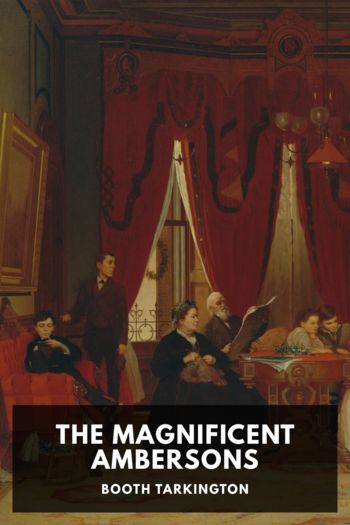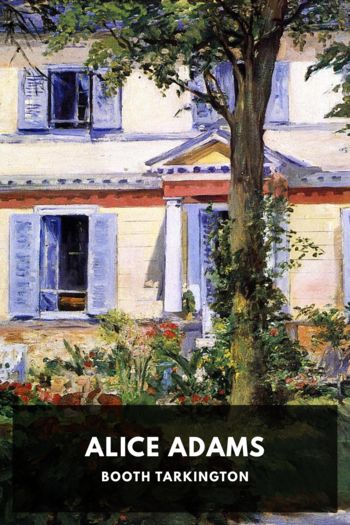National Avenue by Booth Tarkington (book recommendations website .txt) 📕

- Author: Booth Tarkington
Book online «National Avenue by Booth Tarkington (book recommendations website .txt) 📕». Author Booth Tarkington
“How is it horrible?”
“I could tell you, but it’s ten to one that if I merely told you, you’d become Ornaby’s defender—you’re so everlastingly its defender! I’d rather show you, if you’d take me as a passenger in this jewelled palanquin of yours tomorrow.”
Martha assented, and the next afternoon her neat young mechanic drove them northward over the road once travelled on a hot and threatening morning by a “rubber-tired runabout” in which sat a disappointed little bride and a perplexed bridegroom. On that dusty morning, already of the long ago, the way had soon become rustic; the cedar-block paving, itself worn and jolty, had stopped short not much more than a mile from its beginning; then came macadam, but not for long; and then the rough country road, leading north between the great flat fields of corn and wheat to where it became a slough in winter, and tall grass and even ironweed grew between the ruts in summer—for there it reached the soggy and tangled groves of Ornaby.
But on this brisk autumn afternoon, the crystal and enamel of the silent French car went glistening serenely along a level white way of asphalt. The fields, above which the troubled bride and groom had seen rising the clouds of the summer storm, were fields no longer; for here was bungalow-land, acres and acres of bungalows, with brick groceries and drug stores at some of the street corners, and two or three wooden church spires slenderly asserting their right to look down on all the rest. Cross streets gave glimpses of trolley cars on other north-and-south thoroughfares; great brick schoolhouses, unbearably plain, were to be seen, and a few apartment buildings, not made more beautiful by pinchbeck torturing of their façades.
“Of course Dan has no responsibility for this particular awfulness,” Harlan explained. “Without rime or reason the town just decided to grow, and luckily for him it’s grown faster out this northern way than it has in any other direction. Some people seem to think he performed an enchantment to make it do it, but it just happened.”
“It seems to happen faster and faster,” Martha observed. “The last time I drove out this far was in our old carriage with papa, not quite a year ago, I think; and there were dozens of vacant lots; but now there are hardly any. The asphalt wasn’t finished clear into Ornaby then, though Dan had built a fine road through. I suppose now—”
“Oh, yes; now he’s got asphalt on his cross streets, too; and the southern part of Ornaby is so like this you couldn’t tell when you get into it, if it weren’t for the disasters he calls his signboards. Look at that!”
As they spoke the swift car had brought them into a region where there was more vacant ground; and the little houses, nearly all of wood, were not so closely crowded. On a stretch of weedy land, rising slightly above new cement sidewalks, there smote the eye a painted wooden wall two hundred feet long. With enormous yellow words on a black background the thing not only staggered the vision of a passerby, but seemed to bellow in his ear: “You Are Now Entering Ornaby Addition! Build a Home in Ornaby the Beautiful! Every Ornaby Buyer is an Ornaby Booster.”
Beyond came a region of more bungalows: “Homes Beautiful of Ornaby the Beautiful” another bellowing signboard declared them to be; and, not blushing in the very presence of the dwellings and dwellers it thus made proclamation for, went on to insist once more upon the enthusiasm necessarily a consequence in the bosom of anyone who became an “Ornaby Buyer.” There was a briskness about the place: children went busily roller-skating over the new sidewalks; clotheslines were flying their Monday white pennants on the breeze; other bungalows were noisily getting themselves built, and farther on were some white cottages;—“quite pretty,” Martha said they were. Beyond them the open spaces were broader, and the little houses more infrequent; but the asphalt street went on, with numbered white posts marking the building lots, paved cross streets running to right and left into thicket-bordered distances, and Dan’s great signboards shouting along the front of untouched acres of old forest.
“You see for yourself,” Harlan said. “This was beautiful before ‘Ornaby the Beautiful’ insulted the landscape. But now, with all these flimsy and dreadful bungalows and the signboards screeching at the trees—”
“Yes,” she interrupted, “but he’s spared all the trees he could, even back there where the bungalows and little houses were so thick. And I noticed the people were planting shrubberies and trying to make little gardens grow. It might be really very pretty some day. And just here—”
“Oh, here,” Harlan said, “where he hasn’t touched it yet, it’s well enough, of course. But you’ll find it’s only a question of time till he spoils it, though I understand he intends this to be what he calls a ‘restricted residence district.’ ”
The paved street ran between tall woods now; the numbered lots were broad, and the car passed a few proudly marked “Sold.” Then Martha noticed one that was several hundred feet wide, and in depth extended indefinitely into a grove of magnificent beech trees. Stone pillars gave entrance upon a partly completed driveway that disappeared round an evergreen thicket, not long planted. “What a pleasant place to live! It’s getting so smoky in town it seems to me people will have to be moving out even this far some day. Whose place is that?”
“Dan’s,” Harlan said, with his dry laugh. “At least he says he plans to build there sometime. I don’t think Lena cares about it much! I heard her speaking of it as ‘out at the end of Nowhere.’ One of the interesting things about my sister-in-law, to me, is the fact that she’s really never wanted a house of her own. She’s never once proposed such a thing in all this time, I believe, but goes on living with father and





Comments (0)